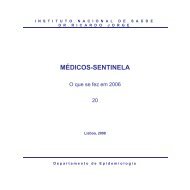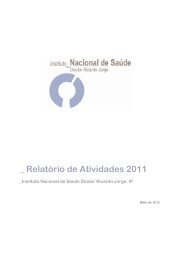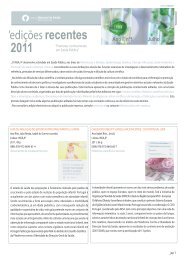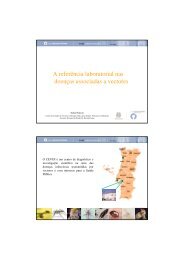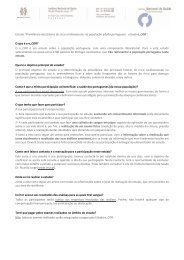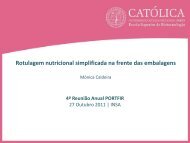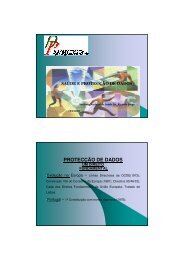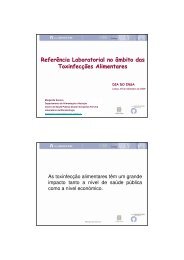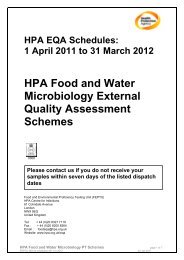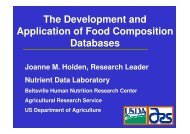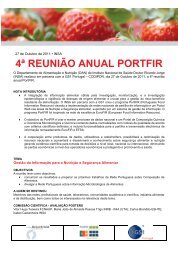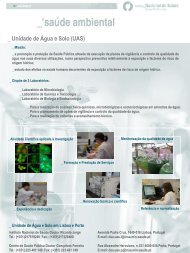European Society of Mycobacteriology - Instituto Nacional de Saúde ...
European Society of Mycobacteriology - Instituto Nacional de Saúde ...
European Society of Mycobacteriology - Instituto Nacional de Saúde ...
Create successful ePaper yourself
Turn your PDF publications into a flip-book with our unique Google optimized e-Paper software.
PP-76<br />
THE UTILITY OF MOLECULAR TESTING IN<br />
ROUTINE MYCOBACTERIOLOGY DIAGNOSIS<br />
Fanourios Kontos, Loukia Zerva.<br />
Clinical Microbiology Laboratory, Medical School <strong>of</strong> Athens, “Attikon” University Hospital, Athens, Greece.<br />
Objective<br />
Molecular methods increasingly replace phenotypic tests in <strong>Mycobacteriology</strong>. This study <strong>de</strong>scribes a “molecular” strategy<br />
that was <strong>de</strong>veloped for routine testing <strong>of</strong> clinical samples and isolates with the goal <strong>of</strong> shortening turnaround time<br />
(TAT) and providing accurate results.<br />
Methods<br />
All samples submitted for mycobacterial cultures (from 12/2006 to 3/2009) were processed and cultured by standard<br />
methodology. The first smear (+) specimen <strong>of</strong> any patient and every first (+) culture were tested by an in-house IS6110-<br />
PCR in or<strong>de</strong>r to differentiate between Mycobacterium tuberculosis complex (MTBC) and nontuberculous mycobacteria<br />
(NTM) (TAT 4 hours). IS6110-PCR (+) specimens or cultures were tested by Genotype MTBDRplus (Hain-LIFESCIENCE)<br />
for MTBC species confirmation and <strong>de</strong>tection <strong>of</strong> Isoniazid and Rifampicin resistance (TAT 2 days). Subsequent culture<br />
(+) specimens from the same patient were tested by Accuprobe MTBC (Biomerieux) (TAT 2 hours). The susceptibility<br />
testing <strong>of</strong> MTBC isolates was performed by MGIT960 (Becton Dickinson). If a (-) result was obtained by the IS6110-<br />
PCR, i<strong>de</strong>ntification <strong>of</strong> isolates procee<strong>de</strong>d using both Genotype Μycobacterium CM and AS (Hain-LIFESCIENCE) (TAT<br />
two days). For NTM species confirmation a PCR-RFLP analysis <strong>of</strong> the hsp65 gene was applied (TAT 3 days); additionally,<br />
sequencing <strong>of</strong> the 16S rRNA gene (TAT 5 days) represented the reference i<strong>de</strong>ntification method for selected isolates.<br />
Results<br />
Out <strong>of</strong> 4.000 specimens, 160 were culture positive (4%) including 85 MTBC positives (63.5% acid fast stain [AFS] positive)<br />
and 75 NTM positives (26.7% AFS positive). Five samples contained more than one NTM species, which were i<strong>de</strong>ntified<br />
only by molecular testing. There was complete agreement between all molecular i<strong>de</strong>ntification methods; however<br />
16S rRNA sequencing was more informative (examples: M. fortuitum and M. lentiflavum, M. celatum). All MTBC isolates<br />
were Rifampicin susceptible, two were high- and one low-level Isoniazid resistant by MGIT960; only the latter was not<br />
recognized by Genotype MTBDRplus.<br />
Conclusions<br />
Focusing on molecular methodology resulted in fast and accurate final reporting. The low inci<strong>de</strong>nce <strong>of</strong> MTBC positivity<br />
among tested specimens (2,1%) justified the <strong>de</strong>cision not to use indiscriminately a direct molecular test for tuberculosis<br />
diagnosis. The frequent occurrence <strong>of</strong> NTM (48,5% <strong>of</strong> all culture positive samples) necessitates direct molecular testing<br />
<strong>of</strong> all AFS (+) specimens.<br />
148 ESM 2009



